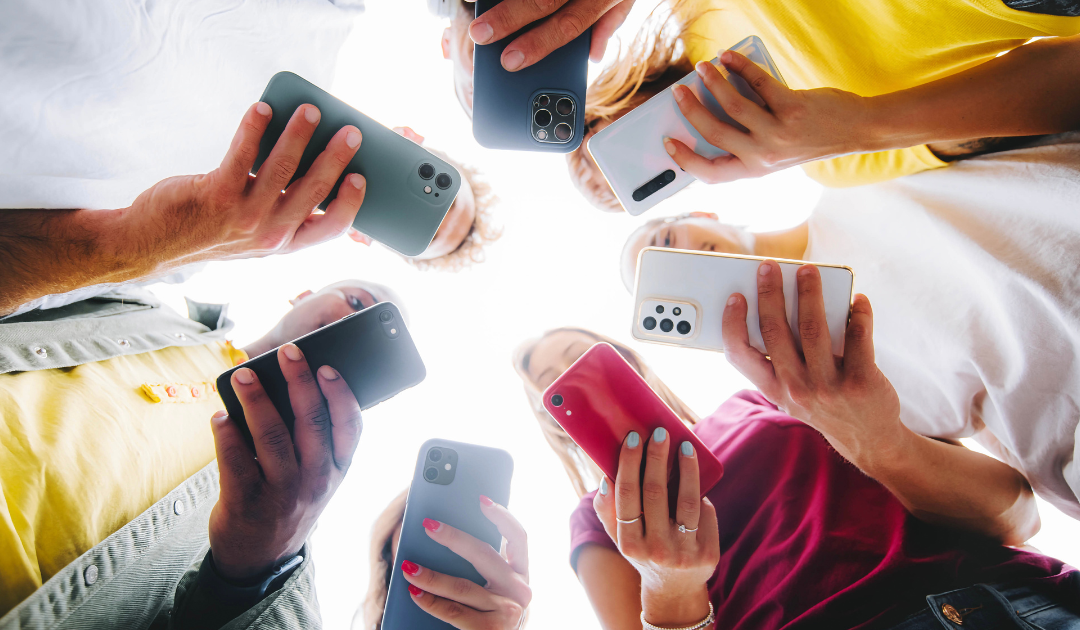Okay, let’s talk about something real for a sec: social media.
We know, we know.
It’s like the place for teens these days. It’s where they connect, share, and, let’s be honest, sometimes compare themselves to unrealistic standards.
But here’s the thing: while it can be a total blast, it can also mess with their mental health.
Let’s break it down.
How can social media affect your mental health?
Social media is like a rollercoaster. One minute you’re laughing at a funny meme, and the next, you’re feeling down about yourself.
It’s a crazy mix of highs and lows.
On one hand, it’s a fantastic way to connect with friends, follow your interests, and discover new stuff. Sharing funny moments, getting support, and feeling part of a community can be a real mood booster.
But let’s be real, it’s not all sunshine and rainbows.
Scrolling through endless highlight reels can make you feel like everyone else is living their best life while you’re stuck in a rut.
Comparing yourself to perfectly curated feeds can lead to body image issues, low self-esteem, and feelings of inadequacy. It’s easy to forget that social media is often a highlight reel, not a real-life reflection.
And let’s talk about FOMO (Fear Of Missing Out).
When it feels like everyone else is having all the fun, it can be tough not to feel left out. Constant notifications and the pressure to stay connected can lead to anxiety and stress.
So, while social media can be a fun and engaging part of your life, it’s important to be aware of its potential downsides.
It’s like anything else – moderation is key.
How can social media cause anxiety?
Social media can be a real anxiety-inducing place. Let’s break it down:
- FOMO (Fear Of Missing Out): Ever scrolled through your feed and felt like everyone’s having a blast except you? That’s FOMO. It’s that nagging feeling that you’re missing out on something amazing.
- Constant Comparison: Social media is full of highlight reels. Seeing everyone’s perfect life can make you feel like you’re not measuring up. It’s easy to forget that people only share their best moments.
- Cyberbullying: Being bullied online can be incredibly hurtful and lead to anxiety and depression. Unfortunately, it’s a reality for many people.
- Overwhelming Information: With so much information at our fingertips, it can be hard to know what’s real and what’s not. This constant influx of news and opinions can be overwhelming and stressful.
It’s important to remember that social media is just a snapshot of someone’s life. Don’t compare your behind-the-scenes to someone else’s highlight reel.
How to heal from social media?
It’s okay to admit that social media can sometimes feel like a toxic relationship. If you’re feeling overwhelmed or drained, it might be time to hit the pause button.
- Take a break: Stepping away from social media, even for a short time, can work wonders. Use this time to recharge and reconnect with yourself.
- Unplug and recharge: Spend time in nature, read a book, or try a new hobby. Disconnecting from the digital world can help you appreciate the real world more.
- Strengthen real-life connections: Focus on building deeper relationships with friends and family. Quality time together can be a game-changer.
- Challenge negative thoughts: Social media can distort reality. If you’re comparing yourself to others, take a step back and challenge those negative thoughts.
- Talk it out: Don’t be afraid to talk to someone you trust about how social media is making you feel. Sharing your feelings can be incredibly helpful.
- Set boundaries: Establish limits on your social media use. This could mean setting time limits, avoiding certain apps, or taking social media breaks.
Remember, social media is a tool, not a necessity. It’s important to use it in a way that enhances your life, not hinders it.
What are the negatives of social media?
Social media can be a real double-edged sword.
While it connects us, it can also disconnect us from what truly matters. Let’s dive into some of the less glamorous sides of this digital world.
First off, let’s talk about mental health.
We’ve already touched on anxiety and FOMO, but it goes deeper than that. Constant exposure to perfectly curated lives can lead to a serious case of the “I’m not good enough” blues. It’s like comparing your behind-the-scenes to someone else’s highlight reel. This can mess with your body image, self-esteem, and overall happiness.
Then there’s the issue of addiction.
Social media is designed to be addictive, with endless scrolling and notifications pulling you in. Before you know it, hours have slipped away, leaving you feeling unproductive and unsatisfied. This can impact your relationships, schoolwork, and even your sleep.
Speaking of sleep, the blue light emitted from screens can disrupt your sleep patterns, making it harder to fall asleep and stay asleep.
This can lead to a whole host of problems, from fatigue and irritability to impaired cognitive function.
And let’s not forget about privacy concerns. Sharing personal information online can be risky. From identity theft to cyberbullying, there are real dangers lurking in the digital world. It’s important to be mindful of what you share and who you share it with.
Lastly, social media can create a distorted view of reality.
It’s easy to get caught up in the filtered, perfectly edited world presented online. This can lead to unrealistic expectations and disappointment in your own life.
Final thoughts
Social media is a wild ride, that’s for sure. It can be a total blast with endless possibilities, but it’s important to remember that it’s not always sunshine and rainbows. The key is to find a healthy balance.
By understanding the potential downsides and having open conversations with your teen, you can help them navigate the social media jungle with confidence. Remember, it’s okay to take breaks, set boundaries, and prioritize real-life connections.
At the end of the day, it’s about finding what works best for you and your teen. By working together, you can create a positive and healthy relationship with social media.

Overview of Navigating the Social Media Jungle: Your Teen’s Mental Health
A deep dive, Q&A of Social Media Mental Health
How can social media affect your mental health?
Social media can significantly impact mental health in both positive and negative ways. On the positive side, social media platforms offer opportunities for connection, allowing people to stay in touch with friends and family, find support communities, and share experiences with others who have similar interests or challenges. However, social media can also negatively affect mental health by increasing feelings of loneliness, anxiety, and depression. Constant exposure to idealized images and lifestyles can lead to unrealistic expectations and self-comparison, fostering feelings of inadequacy and low self-esteem. The pressure to maintain a perfect online persona can be stressful, leading to increased anxiety and reduced life satisfaction. Moreover, the addictive nature of social media can disrupt sleep patterns, decrease face-to-face interactions, and contribute to feelings of isolation, all of which can harm mental well-being.
How can social media cause anxiety?
Social media can cause anxiety in several ways. One of the primary causes is the fear of missing out (FOMO), which occurs when individuals perceive that others are experiencing more rewarding or exciting lives, leading to feelings of inadequacy and insecurity. Constant exposure to curated and often unrealistic portrayals of people’s lives can exacerbate this anxiety, as individuals may feel pressured to keep up with their peers. The instant nature of social media can also create pressure to respond quickly to messages and notifications, leading to stress and a sense of being overwhelmed. Negative interactions, such as cyberbullying, criticism, or exposure to distressing news, can further increase anxiety levels. Moreover, the addictive nature of social media can contribute to a cycle of compulsive checking, which can heighten anxiety and disrupt daily routines and sleep patterns.
How to heal from social media?
Healing from the negative impacts of social media involves developing healthier habits and boundaries around its use. Start by taking regular breaks from social media to disconnect and recharge, allowing time for reflection and relaxation. Set boundaries by limiting the time spent on social media platforms and designating specific periods for checking and engaging online. Cultivate a more mindful approach to social media by curating your feed, following accounts that inspire and uplift you, and unfollowing those that contribute to negative feelings. Engage in offline activities that promote well-being, such as exercise, hobbies, and spending quality time with friends and family. Practicing gratitude and focusing on real-life experiences can help shift attention away from comparison and negativity. Lastly, seek support from mental health professionals if needed, as they can provide guidance and strategies for managing social media’s impact on mental health.
What are the negatives of social media?
Social media has several negative aspects that can impact individuals and society. One of the main negatives is the potential for fostering feelings of inadequacy and low self-esteem due to constant comparisons with others’ curated and often unrealistic portrayals of their lives. Cyberbullying and online harassment are significant concerns, leading to emotional distress and harm. Social media can also contribute to the spread of misinformation, leading to confusion and mistrust. The addictive nature of social media can result in decreased productivity, disrupted sleep, and neglect of real-life relationships and responsibilities. Furthermore, the emphasis on likes, shares, and comments can create a false sense of validation and self-worth, leading to an unhealthy reliance on external approval. Finally, excessive use of social media can contribute to increased feelings of loneliness and isolation, as online interactions may lack the depth and authenticity of face-to-face connections.
ValueCore Mental Health
Empowering Self-Worth, Redefining Foundations – Your Path to Lasting Mental Health with Relatable, Real Support
Stay In Touch! Subscribe to our newsletter:
Canby Oregon Location
409 NW 2nd Ave Ste. A Canby, OR 97013
Portland Oregon Location
7105 SW Varns St. Ste 270 Tigard, OR 97223
Salem Oregon Location
1235 Woodrow St NE Salem, OR 97301
valeucore@vcmh.com
Phone Number
(503) 389-1500

